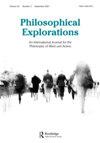Skepticism about reasons for emotions
IF 1.1
3区 哲学
0 PHILOSOPHY
引用次数: 3
Abstract
ABSTRACT According to a popular view, emotions are perceptual experiences of some kind. A common objection to this view is that, by contrast with perception, emotions are subject to normative reasons. In response, perceptualists have typically maintained that the fact that emotions can be justified does not prevent them from being perception-like in some fundamental way. Given the problems that this move might raise, a neglected alternative strategy is to deny that there are normative reasons for emotions in the first place. The aim of this paper is to offer the first sustained discussion of arguments for skepticism about normative reasons for emotions. I argue that none of the obvious ways to argue against reasons for emotions casts genuine doubt on them, and thus that unless another argument is given an appeal to reasons for emotions continues to constitute a legitimate strategy to assess various theories of emotion.对情绪原因的怀疑
根据一种流行的观点,情绪是某种感性体验。对这一观点的普遍反对意见是,与感知相反,情绪受制于规范性原因。作为回应,感知主义者通常坚持认为,情绪可以被证明是合理的这一事实并不妨碍它们在某些基本方面具有感知性。考虑到这一举动可能带来的问题,一个被忽视的替代策略是从一开始就否认情绪存在规范性原因。本文的目的是提供关于情绪的规范性原因的怀疑论的论点的第一个持续的讨论。我认为,没有任何一种明显的反对情绪原因的方法能让人对它们产生真正的怀疑,因此,除非给出另一个论据,否则对情绪原因的呼吁将继续构成评估各种情绪理论的合法策略。
本文章由计算机程序翻译,如有差异,请以英文原文为准。
求助全文
约1分钟内获得全文
求助全文

 求助内容:
求助内容: 应助结果提醒方式:
应助结果提醒方式:


